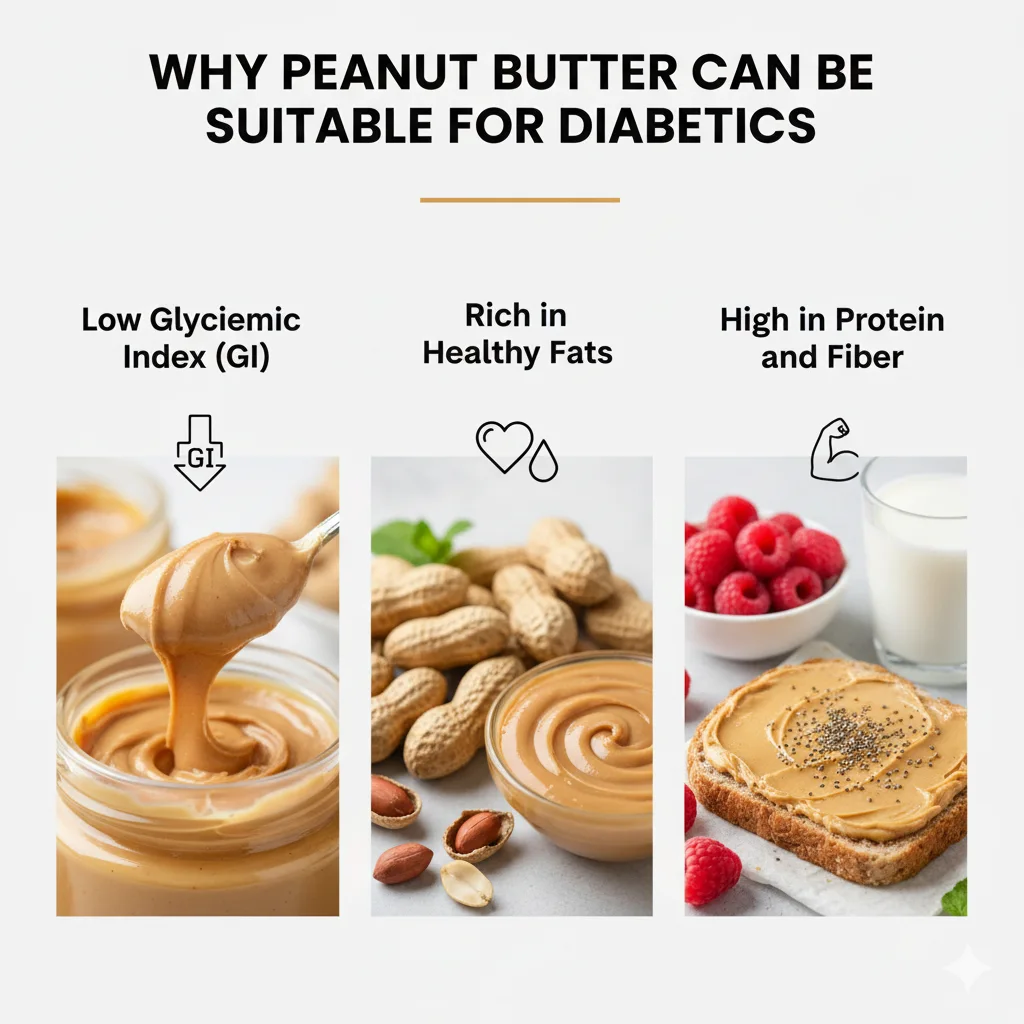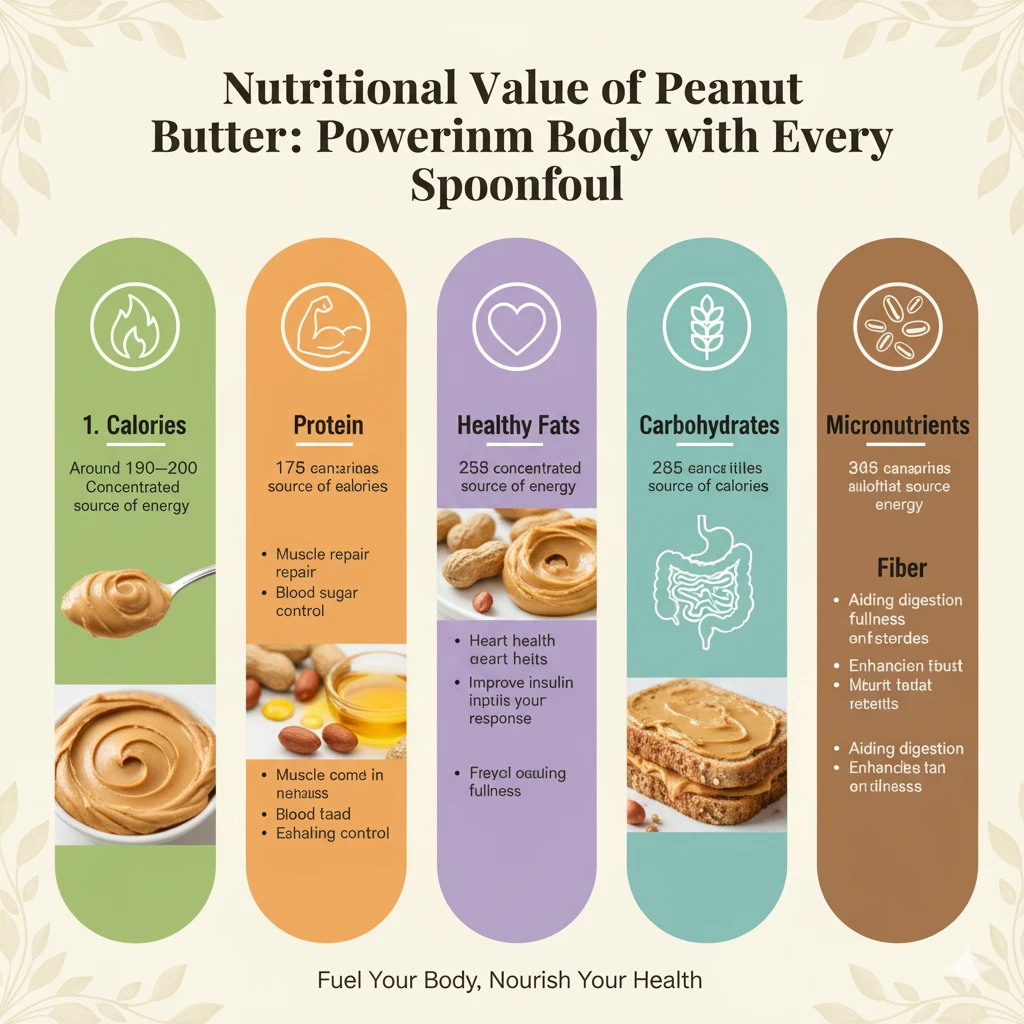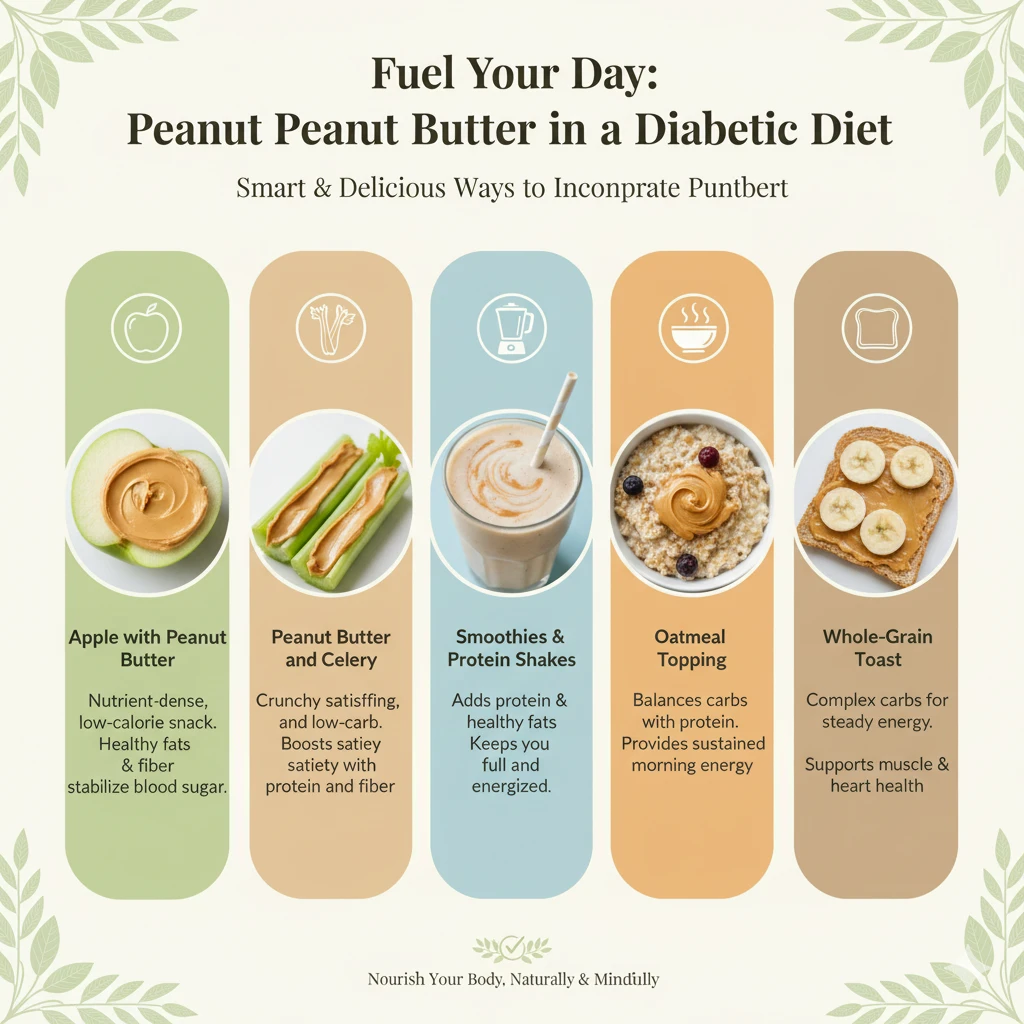
Which Peanut Butter Is Best For Diabetic Patients?
Introduction
Peanut butter is a delicious and versatile spread loved by millions around the world, but if you are managing diabetes, it is natural to ask: Is peanut butter good for a diabetic? The truth is that peanut butter, when eaten in moderation and chosen wisely, can be a highly beneficial addition to a diabetic-friendly diet. Its combination of protein, healthy fats, and dietary fiber can help stabilize blood sugar levels, provide sustained energy, and support overall health.
In addition to its nutritional value, natural and organic peanut butter options have become increasingly popular, as they are free from added sugars and unhealthy oils. Including peanut butter thoughtfully in your meals can provide a balanced approach to snacking and meal planning, helping to maintain both satisfaction and blood sugar control throughout the day.
Why Peanut Butter Can Be Suitable for Diabetics

Peanut butter contains multiple properties that make it a smart choice for individuals managing diabetes:
Low Glycemic Index (GI)
Peanut butter has a low glycemic index of just 14, meaning it has minimal impact on blood sugar levels compared to high-GI foods such as white bread or sugary snacks. Foods with a low GI are absorbed slowly into the bloodstream, helping to prevent sudden spikes in glucose levels. This makes peanut butter a safe option for diabetics when incorporated into balanced meals or snacks.
Rich in Healthy Fats
Peanut butter is rich in heart-healthy monounsaturated and polyunsaturated fats, which not only help reduce bad LDL cholesterol but also improve insulin sensitivity. Improved insulin sensitivity allows the body to manage blood sugar levels more efficiently, reducing the risk of diabetes-related complications. These fats are also beneficial for cardiovascular health, which is particularly important for people with diabetes, as they have a higher risk of heart disease.
High in Protein and Fiber
Protein and fiber in peanut butter work together to promote feelings of fullness, reduce overeating, and slow the absorption of sugar from other foods. This helps in maintaining steady blood sugar levels and controlling cravings between meals. Additionally, the protein content supports muscle health and energy levels, which is beneficial for those managing diabetes and maintaining an active lifestyle.
Nutritional Value of Peanut Butter

Understanding the nutritional composition of peanut butter and peanut butter benefits can help diabetics make informed choices about portion sizes and meal combinations. A standard 2-tablespoon (32g) serving typically contains:
-
Calories: Around 190–200 calories, providing a concentrated source of energy that can be satisfying in small portions.
-
Protein: Approximately 7–8 grams, supporting muscle repair, satiety, and blood sugar control.
-
Healthy Fats: About 16 grams, primarily unsaturated, which support heart health, improve insulin response, and reduce inflammation.
-
Carbohydrates: 6–8 grams, with most coming from fiber and complex carbohydrates that are slowly digested.
-
Fiber: 2–3 grams, aiding digestion, enhancing fullness, and reducing rapid blood sugar spikes.
-
Micronutrients: Magnesium, vitamin E, niacin, folate, and antioxidants, all of which contribute to overall metabolic health, nerve function, and immunity.
This nutrient-dense profile makes peanut butter an excellent option for diabetics, as it provides essential nutrients without causing sudden blood sugar fluctuations.
Health Benefits of Peanut Butter for Diabetics
Including peanut butter in a diabetic diet can provide a wide range of health benefits:
Helps Control Blood Sugar Levels
Eating peanut butter with meals or snacks slows down the absorption of carbohydrates, preventing sudden blood sugar spikes. Pairing peanut butter with low-GI foods such as apples, whole-grain bread, or oatmeal can further enhance its blood sugar-stabilizing effect. This makes it an ideal choice for diabetics who want to manage their glucose levels while enjoying tasty foods. Sugar patients can eat peanut in moderation, especially natural or organic varieties, without major impact on blood sugar levels.
Supports Heart Health
Peanut butter contains unsaturated fats and antioxidants that promote cardiovascular health by lowering LDL cholesterol and supporting arterial function. For diabetics, who are at increased risk of heart disease, including heart-healthy foods like peanut butter can significantly reduce the chances of cardiovascular complications.
Aids Weight Management
The combination of protein, fiber, and healthy fats in peanut butter can create a feeling of fullness and reduce cravings, helping with portion control and weight management. Maintaining a healthy weight is critical for diabetes management, as excess body fat can impair insulin sensitivity and increase blood sugar levels.
Provides Long-Lasting Energy
The balanced mix of protein, fats, and fiber ensures a slow release of energy, preventing mid-morning or mid-afternoon energy crashes. This is particularly useful for diabetics who need consistent energy without triggering spikes in blood sugar.
Contains Essential Vitamins and Minerals
Peanut butter is a good source of magnesium, vitamin E, niacin, and folate, which support nerve health, reduce inflammation, boost immunity, and improve metabolic functions. These nutrients are especially valuable for diabetics, as they can help prevent complications related to diabetes and support overall well-being.
Benefits of Eating Peanut Everyday
Consuming peanuts or peanut butter every day, in moderation, can enhance heart health, provide essential nutrients like magnesium and vitamin E, and support stable blood sugar levels. Daily inclusion ensures a steady intake of healthy fats and protein, contributing to overall wellness.
How to Incorporate Peanut Butter Into a Diabetic Diet

Here are some practical and tasty ways to enjoy peanut butter while keeping blood sugar levels under control:
-
Apple with Peanut Butter Benefits: Slice an apple and pair it with a tablespoon of peanut butter for a snack that combines fiber, vitamins, and healthy fats. This mix helps slow sugar absorption from the fruit and promotes satiety.
-
Peanut Butter and Celery: Spread natural peanut butter on celery sticks to create a crunchy, low-carb snack that is filling and nutrient-rich. This combination provides fiber, protein, and healthy fats without adding extra sugar.
-
Smoothies and Protein Shakes: Add a spoonful of peanut butter to smoothies or shakes for enhanced creaminess, protein content, and healthy fats. Combining it with low-GI fruits and unsweetened milk or yogurt creates a blood sugar-friendly beverage.
-
Oatmeal Topping: Stir peanut butter into your morning oatmeal for a creamy texture and added nutrients. This combination provides complex carbohydrates, fiber, protein, and healthy fats, keeping you full until lunchtime.
-
Whole-Grain Toast: Spread natural peanut butter on whole-grain toast for a balanced breakfast or snack that supports energy and blood sugar stability.
Choosing the Right Peanut Butter
Not all peanut butter is safe or beneficial for diabetics. To maximize health benefits, consider the following:
-
Natural or Organic Peanut Butter: Organic peanut butter benefit that it reduces exposure to harmful pesticides and chemical additives, making it a safer and cleaner choice. Organic options maintain the natural nutrients of peanuts while supporting overall health, especially for those managing diabetes.
-
Avoid Added Sugars and Hydrogenated Oils: These ingredients can increase blood sugar spikes and contribute to unhealthy cholesterol levels, reducing the health benefits of peanut butter.
-
Check for Quality and Safety: Opt for brands that source peanuts responsibly and minimize exposure to aflatoxins, which are harmful mold toxins found in poorly stored peanuts.
Nutrionex Foods – A Trusted Private Label Peanut Butter Manufacturer and Exporter
For those seeking high-quality peanut butter, Nutrionex Foods is a leading private label manufacturer and exporter, specializing in natural and organic options suitable for diabetics. Their products are crafted to maintain the full nutritional value of peanuts while minimizing additives and sugars.
Nutrionex Foods offers a wide range of innovative flavors, such as mint, pineapple, honey, coffee, and chocolate Peanut Butter, making healthy snacking enjoyable for all. With their commitment to quality and nutrition, diabetics and health-conscious consumers can safely include peanut butter in their diet without compromising blood sugar control.
Frequently Asked Questions
1. Can type 2 diabetics eat peanut butter?
Yes, type 2 diabetics can include peanut butter in their diet in moderation. Natural or organic varieties without added sugars are the best choices.
2. What are the benefits of eating peanut butter daily?
Regular, mindful consumption can aid blood sugar control, support heart health, improve satiety, and provide essential nutrients for overall well-being.
3. Is organic peanut butter better for diabetics?
Organic peanut butter reduces exposure to pesticides and additives, offering a cleaner and healthier choice for individuals managing diabetes.
4. How does peanut butter affect blood sugar levels?
Its low glycemic index, combined with protein and fiber, helps slow sugar absorption and prevent sudden spikes in blood glucose.
5. What is the nutritional value of peanut butter?
Peanut butter contains protein, healthy fats, fiber, and vitamins like magnesium, vitamin E, niacin, and folate, making it a nutrient-dense addition to a diabetic diet.
Conclusion
Peanut butter can be a highly beneficial food for diabetics when consumed thoughtfully and in moderation. Its combination of low glycemic index, healthy fats, protein, and fiber supports blood sugar control, heart health, weight management, and overall energy. Choosing natural or organic peanut butter and pairing it with fiber-rich foods like fruits, vegetables, and whole grains maximizes its health benefits.
Nutrionex Foods, as a leading private label peanut butter manufacturer and exporter, provides safe, high-quality options suitable for diabetics and health-conscious individuals. Their diverse flavors and commitment to quality make it easier to enjoy peanut butter daily without compromising health.
Disclaimer: This article is for informational purposes only. Individuals with diabetes or other health conditions should consult their doctor or a registered dietitian before making any significant changes to their diet.
